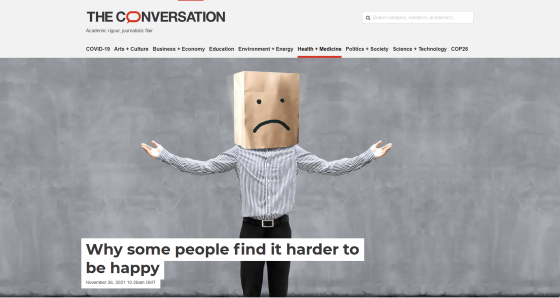He argues that it is not only the 'gene' that determines whether or not you can be happy, but also the 'person's choice and environment'.

'Happiness' has become a life goal and guide for many people, and
Why some people find it harder to be happy
https://theconversation.com/why-some-people-find-it-harder-to-be-happy-171692

Research such as 'how to live happily ' and 'psychological exercises to increase happiness ' is booming because most people want to be happy, while depression and self-harm. Self-harm remains a problem all over the world. In recent years, attention has been focused on the magnitude of the impact of innate genes on human health and characteristics, and the idea that 'whether or not you can be happy depends on the genes' is increasing.
In fact, according to a (PDF file) article published in the 2005 scientific journal Review of General Psychology , 50% of people's well-being is due to genes, 40% is due to intentional behavior, and the remaining 10% is due to intentional behavior. It depends on the environment in which the person is placed. Initially, this ratio called the 'happiness pie' was criticized for the genetic assumptions on which it was calculated as unreliable, but subsequent studies have shown that 40-50% of the difference in happiness is. The results were shown to be explained by genetics.
Many behavioral geneticists use 'twin' as a person who grew up in the same environment to estimate environmental and genetic factors in an individual's growth. Researchers assume that identical and dizygotic twins are placed in the 'same environment' when raised in the same household, but Burke says this assumption doesn't really hold. I'm pointing out.

'Nature and upbringing are not independent of each other,' Burke said, saying that genes affect people's behavior in choosing their environment, so different genes have different environments. Insist. For example, a child who inherits a diplomatic personality from a parent is more likely to grow up in an environment with many friends because it is easier to make friends.
Similarly, the environment in which a person is placed also
Burke said, 'Nature and upbringing are interdependent and always influence each other. This allows two people who grew up in the same environment to react differently, so the behavioral genetics'same. The 'Environment' assumption is no longer valid. '

Burke further argues that people's well-being depends on their '
Burke points out that there is no uniform and effective positive psychological intervention for everyone because people's personalities are as unique as DNA and their tolerance for well-being and changes in life is different. On the other hand, although it is true that genes may make it difficult to be happy, it is possible that you can be happy if you switch to a healthy lifestyle or change your living environment.
'Even if genetics plays an important role in our well-being, it does not determine'who we are'. What is important is where we live and with whom we live. And how we live our lives, it's a choice that affects the well-being of us and the next generation, 'Burke said.

Related Posts:
in Note, Posted by log1h_ik







